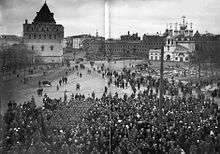
Meeting at the Blagovescenskaya Square, 1917
The Russian Revolution was a period of political and social revolution across the territory of the Russian Empire, commencing with the abolition of the monarchy in 1917, and concluding in 1923 after the Bolshevik establishment of the Soviet Union and end of the Civil War.
Quotes
- The Russian revolution was nominally based on Communist dogma; but its significant struggle was to find some instrument by which a vast backward country could be mauled into industrialization. The capitalist revolution in which the United States was the leader found apter, more efficient and more flexible means through collectivizing capital in corporations.
- Adolf A. Berle, The 20th century capitalist revolution. 1954. p. 23
- Looking back one perceives only a massive operation, struggle, and action. In reality there were no heroes or leaders. It was the people, the working people, in soldiers' uniform or in civilian attire, who controlled the situation and who recorded its will indelibly in the history of the country and mankind. It was a sultry summer, a crucial summer of the revolutionary flood-tide in 1917!
- Alexandra Kollontai, The Autobiography of a Sexually Emancipated Communist Woman (1926), Translated by Salvator Attanasio, Herder and Herder, 1971.
- The issue was to wage a struggle against the war, against coalescence with the liberal bourgeoisie, and for the power of the workers' councils, the Soviets.
- Alexandra Kollontai, The Autobiography of a Sexually Emancipated Communist Woman (1926), Translated by Salvator Attanasio, Herder and Herder, 1971.
- Then came the great days of the October Revolution. Smolny became historic. The sleepless nights, the permanent sessions. And, finally, the stirring declarations. "The Soviets take power!" "The Soviets address an appeal to the peoples of the world to put an end to the war." "The land is socialized and belongs to the peasants!"
- Alexandra Kollontai, The Autobiography of a Sexually Emancipated Communist Woman (1926), Translated by Salvator Attanasio, Herder and Herder, 1971.
- When one recalls the first months of the Workers' Government, months which were so rich in magnificent illusions, plans, ardent initiatives to improve life, to organize the world anew, months of the real romanticism of the Revolution, one would in fact like to write about all else save about one's self.
- Alexandra Kollontai, The Autobiography of a Sexually Emancipated Communist Woman (1926), Translated by Salvator Attanasio, Herder and Herder, 1971.
- The Russian Revolution of 1917 was patently a continuation of the French Revolution of 1789 in its eastern advance. It smashed autocracy, gave land to the peasants, liberated oppressed nationalities, and in addition promised to rid the industrial system of the blemishes of exploitation. In its heroic age, Soviet socialism was given selfless support by the writers and artists of the West. They steeled their muscles in an epic defence of freedom, democracy, and socialism against the pagan upsurge of Teutonic fascism. Hitler’s persecution of Bolsheviks and Jews was in the last resort directed against Christian universalism and its derivatives in the industrial present. His onslaught on traditional values, root and branch, created the modern West.
- Karl Polanyi, "For a New West" (1958)
External links
This article is issued from
Wikiquote.
The text is licensed under Creative
Commons - Attribution - Sharealike.
Additional terms may apply for the media files.